01. Then & Now

OPENING SCENE:
The screen fades from black to grainy footage of an 80s neon-lit cityscape at dusk, punctuated by a synth-heavy track that subtly shifts from the upbeat to melancholic, reflecting the complexity of the band's legacy.
The camera zooms in on the framed album cover of one of their most popular hit records, "Velvet Rain," resting against a backdrop of vintage cassette tapes, vinyls, and yellowed press clippings. The image slowly fades out as the opening credits roll.
CUT TO: Interview Room
The shot segues to a dimly lit room, all retro décor—fuzzy carpets, geometric art on the walls, and old equipment stacked in the background.
Six chairs are arranged in a semicircle, with each band member seated separately, bathed in soft light. Each of them holds a contemplative, somewhat distant, expression, the weight of the past tangible in their presence.
The shot transitions to a frame of a lone chair, footfall echoing in the foreground. A woman appears, her once sable hair, now layered in strips of pepper and frost.
WREN CARNEGIE (former lead vocalist of Wren & The Static): [Reflective] It feels . . . like we were all on the edge of something big. Like we were on the verge of rewriting the rules of the 80s sound, but none of us really knew how to handle it when it started happening.
CUT TO: Miles Kelsi
Miles, a sharp contrast with his sharp jawline and intense stare, sits with his arms crossed. His posture is stiff, his mind seemingly elsewhere as his eyes flicker, hinting at the inner tension.
MILES KELSI (former drummer of Wren & The Static): [Dismissive] People like to paint us as "what could've been." We weren't some big tragedy. We were a product of our time, no more, no less. The chemistry was there . . . until it wasn't.
CUT TO: Bodhi Finn
Bodhi, the laid-back, charismatic bass guitarist, smirks slightly, his hands drumming lightly on his knees as he leans back in his chair. There's a lightness to him, though his words carry more weight than his demeanor.
BODHI FINN (former bass guitarist of Wren & The Static): [With a chuckle] I remember when we first played together, it was fire. I mean, yeah, we were fresh out of high school, just jamming in my garage. But then . . . Wren and Sasha came into the picture, and suddenly it wasn't just static, it was Static with a purpose.
CUT TO: Sasha Slater
Sasha, seated with one bell bottomed pants leg folded over the other, looks almost wistful. A saxophone rests across her lap, her fingers absentmindedly tracing its curves. Her expression betrays a deeper emotional connection to the story, as if the band's brief success and implosion were tied to something more personal.
SASHA SLATER (former saxophonist of Wren & The Static): [Softly] I met Wren in grade school. A little Washington town called Tidewater. We were inseparable back then. When she brought me into the fold, it felt like a reunion of sorts—like it was always meant to be, you know? But the fame, the pressures . . . it took its toll. [Pauses] On all of us.
CUT TO: Malakai "Kai" Kelsi
Malakai, the quiet, cerebral force behind the band, adjusts his thin-rimmed tortoise shell glasses as he props his elbow on the back of his seat. He holds his composure well but his voice is slightly tinged with melancholy.
KAI KELSI (former co-lead vocalist & lead guitarist of Wren & The Static): [Thoughtful] Everyone saw the flashy lights, the fame, the tours . . . But we were just trying to make sense of everything, trying to make it work. It wasn't just the music that kept us together, it was . . . it was the dreams we all shared. Until they weren't the same dreams anymore.
CUT TO: Miles
Miles, arguably the most guarded of the group, speaks almost reluctantly, his fingers twitching over the edge of the drum sticks laid meticulously on a table at his side. His face shows the wear of someone who's carried the weight of unspoken things.
MILES: [Quietly] Static wasn't just a band to me. It was my brothers, my family. Just rocking it out, three kids and a dream. We fantasized about this, fought tooth and nail for it. Then it grew, and grew, and became something entirely different. We became something entirely different. And when it all started to fall apart . . . I think we all stopped fighting for the same thing.
CUT TO: A Montage of Early Days
The camera transitions to old footage of the band in their earliest days—risky basement rehearsals, a smoky jazz bar where Wren and Sasha perform an impromptu set, and Static's first gigs, gradually building momentum.
The footage is interspersed with snapshots of the media blitz, the frenzy of a new sound in the air, and the sheer energy that once defined their rise.
CUT TO: Wren
WREN: One night, we were just another bar duo. Sash and me. The next . . . we were selling out shows in cities we never even imagined ever playing in.
But for every song that played on the radio, something else was fading. The music we made started to mean different things to all of us.
CUT TO: The Present
The camera lingers on the empty chairs of the interview room, the silence hanging in the air. The final line of the opening sequence echoes, suggesting a mystery that has yet to be solved, secrets left to be unveiled.
WREN: We were more than a band. We were six people trying to make sense of something bigger than us. And when the music stopped we just . . . scattered. But we can't run from the past. Not then, and not now.
The screen fades to black.
The synth-heavy music swells.
END OF OPENING SCENE
Bạn đang đọc truyện trên: AzTruyen.Top